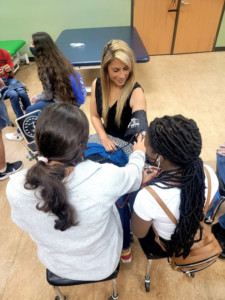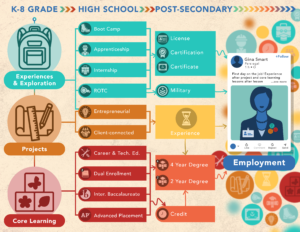Everybody Needs an Equal Opportunity to Participate in the Future

Michael Moe (@michaelmoe) is co-founder of GSV, a fund, advisory and incubator driven by the “boom of big ideas” that is transforming every industry from healthcare to communication, transportation, energy and now global education.
Moe’s 2020 Vision (a book and microsite) is that to restore the fabric of the United States everybody needs an equal opportunity to participate in the future. The vision is based on a dozen megatrends creating new opportunities (read a summary of the report).
 In 2010 Moe and partner Deborah Quazzo hosted their first education conference. Three hundred people and 30 EdTech companies crowded into the administrative offices of Arizona State University. Like the GSV fund, the conference aimed to accelerate innovation in education and optimize impact.
In 2010 Moe and partner Deborah Quazzo hosted their first education conference. Three hundred people and 30 EdTech companies crowded into the administrative offices of Arizona State University. Like the GSV fund, the conference aimed to accelerate innovation in education and optimize impact.
The seventh ASU-GSV summit in April was 10 times the size of the first summit. It’s now the biggest and best conference focused on innovation in learning (check out Moe’s keynote slides).
The next ASU-GSV Conference is May 8-10 in Salt Lake City, Utah.
Moe is bullish on innovation and the opportunity to improve people’s lives. He’s encouraged by the potential of low-cost computing and storage and three (soon to be four) billion people connected to the idea economy.
Project-Based World
Moe invests in many of the world’s most innovative companies where talent is job #1–attracting and growing the best people.
“Millennials are expecting 10-15 careers,” said Moe, “so that means a lot of lifelong learning for free agent nation in the gig economy.”
That will require new learning bargain between employer and employee (one Reid Hoffman discusses in his new book, The Alliance: Managing Talent in the Networked Age). There won’t be any long-term employment guarantees, but it doesn’t work if every employee acts like a free agent. The new bargain will be a string of projects with associated learning opportunities.
Moe thinks “learning how to learn” is key. He calls it KaizenEDU. Kaizen is Japanese for “continuous improvement.” KaizenEDU refers to continuous learning for everyone. Episodic learning is being replaced by seamless, continuous learning driven by a constant need for new knowledge.
“Knowledge is the new currency,” said Moe. He sees real-time learning as a continuum from on-demand bite-sized modules to courses with a real-time audit of skills with microcredentials and portfolios as new market signals.
“There’s a new mindset in networked and flattened organizations,” said Moe. Diversity is increasingly recognized as a good thing that leads to the best outcomes.
Moe thinks quality education is a difference maker for individuals, companies and countries. It’s what gives every person has an equal opportunity to participate in the future because “the best job is one you create for yourself.” Moe would like to see more entrepreneurship education.
With increased investment in EdTech, Moe sees a chance to boost access, quality and value. He also hopes that it will attract more talent into sector.
In a world where learning is currency, Moe thinks investment and innovation will help address the core problem that “talent is equally distributed, but opportunity is not.”
Signposts
Because GSV appreciates that megatrends tend to go underappreciated, the report includes a deep dive into global trends and seven education specific trends:
- ROE. Return on Education (ROE) is the realization that the greatest returns will be created where companies achieved the greatest educational impact–investors share learner interests. Through greater transparency and integrated Big Data analytics, massive capital flows are being directed to the education companies demonstrating scale and impact.
- KaizenEDU. Kaizen is Japanese for “continuous improvement.” KaizenEDU refers to “continuous learning,” effectively that all people are students. Episodic learning is being replaced by seamless, continuous learning driven by a constant need for new knowledge.
- Hollywood Meets Harvard. We needed to create education resources where there was high engagement, leading people to learn because they were interested, rather than being pushed. Hollywood is also a reminder that large investments in content quality can be leveraged over massive audiences.
- Knowledge as Currency. The old ticket to ride was a degree. The new ticket is a Personal Knowledge Portfolio that incorporates content, courses and experiences curated over time. Fundamental skills include critical thinking, entrepreneurship, quantitative reasoning and communication.
- Big Data = Smart Data. Advances in data science and database technology have unlocked insights for a wide range of industries. In education, recommendation engines and adaptive learning systems are powering personalized learning.
- Mobile. Nearly 90% of high school and college students own a smartphone— it’s the first thing they look for when they wake up and the last thing they see before going to sleep. Learning platforms must be mobile friendly. Wearables are just the beginning of the quantified self.
- Mind, Body, Soul. Brain research and cognitive science are providing insights into how we learn. We’re beginning to appreciate that the brain is influenced by physical fitness, happiness, diet and wellness.
For more, see:
Stay in-the-know with all things EdTech and innovations in learning by signing up to receive the weekly Smart Update.








0 Comments
Leave a Comment
Your email address will not be published. All fields are required.